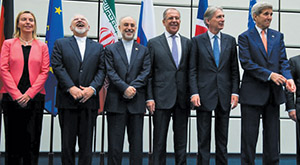
(Combined services and Israel Hayom Staff) Iran and six major world powers reached a nuclear agreement on Tuesday, capping more than a decade of negotiations with an agreement that could potentially transform the Middle East, and which Israel called a “historic surrender.”
Under the deal, sanctions imposed by the United States, European Union and United Nations would be lifted in return for Iran agreeing to long-term curbs on a nuclear program that the West has long suspected is aimed at creating a nuclear bomb.
The accord will keep Iran from producing enough material for a nuclear weapon for at least 10 years and impose new provisions for inspections of Iranian facilities, including military sites. The deal reportedly includes a mechanism under which the International Atomic Energy Agency could get access to suspect nuclear sites in Iran within 24 days.
Reaching a deal is a major policy victory for both U.S. President Barack Obama and Iran’s President Hassan Rouhani, who was elected two years ago on a vow to reduce the diplomatic isolation of his country of 77 million people.
But both men face skepticism from hard-liners at home after decades of enmity between nations that referred to each other as “the Great Satan” and a member of the “axis of evil.”
“This is a historic moment,” Iranian Foreign Minister Mohammad Javad Zarif said as he attended a final session alongside his counterparts from the United States, Britain, China, France, Germany and Russia in Vienna on Tuesday morning.
“We are reaching an agreement that is not perfect for anybody, but it is what we could accomplish, and it is an important achievement for all of us. Today could have been the end of hope on this issue. But now we are starting a new chapter of hope.”
Rouhani wrote on his Twitter feed that the “deal shows constructive engagement works. With this unnecessary crisis resolved, new horizons emerge with a focus on shared challenges.”
Israel will strongly oppose the agreement. It sees the acceptance of extensive Iranian nuclear infrastructure and continued nuclear activity as a mortal threat, and has warned that it could take military action on its own, if necessary. Prime Minister Benjamin Netanyahu called the deal “a bad mistake of historic proportions.”
Netanyahu has received a copy of the agreement. He was expected to convene the cabinet to discuss the text.
From the moment the deal is signed, Congress has 60 days to review it and vote on its approval. Should Congress reject the deal, Obama can then veto the rejection. It would require two-thirds of lawmakers to override such a veto, which means some of Obama’s fellow Democrats would have to rebel against one of their president’s signature achievements in order to kill the deal.
Final talks in Vienna involved nearly three weeks of intense round-the-clock negotiations between U.S. Secretary of State John Kerry and Zarif — a situation entirely unprecedented between the two countries.
Western diplomats said that under the final agreement Iran had accepted a “snapback” mechanism, under which some sanctions could be reinstated in 65 days if it violates the deal. A U.N. weapons embargo would remain in place for five years and a ban on buying missile technology would remain for eight years.
Zarif and the EU’s foreign policy chief, Federica Mogherini, spoke to reporters before the forum convened to adopt the agreement. Zarif said the agreement was a “win-win solution,” while Mogherini called the agreement “a sign of hope for the entire world.”
Meanwhile, U.S. allies in the region are worried about an agreement that would benefit Iran.
Iran does not recognize Israel and supports its enemies. Arab states ruled by Sunni Muslims, particularly Saudi Arabia, believe Iran supports their foes in wars in Syria, Yemen and elsewhere.
But there is also strong reason for the United States to improve its relations with Iran, as the two countries face a common foe in Islamic State, the Sunni Muslim militant group that has seized swathes of Syria and Iraq.
For Iran, the end of sanctions could bring a rapid economic boom by lifting restrictions that have drastically cut its oil exports and hurt its imports. The prospect of a deal has already helped push down global oil prices because of the possibility that Iranian supply could return to the market.
Oil prices dropped more than a dollar on Tuesday after the deal was reached.
Meanwhile, the IAEA signed a road map with Iran on Tuesday with the aim of resolving all outstanding questions it has about the country’s nuclear program by the end of the year, the IAEA’s director general said.
Future access to Iran’s Parchin military site, which the agency had repeatedly sought, is part of a separate arrangement, Yukiya Amano said.
“I have just signed the road map between the Islamic Republic of Iran and the IAEA for the clarification of the past and present outstanding issues regarding Iran’s nuclear program,” Amano said. “This is a significant step forward toward clarifying outstanding issues regarding Iran’s nuclear program. The road map sets out a process under the November 2013 framework for cooperation to enable the agency with the cooperation of Iran to make an assessment of issues relating to possible military dimensions to Iran’s nuclear program by the end of 2015.”













